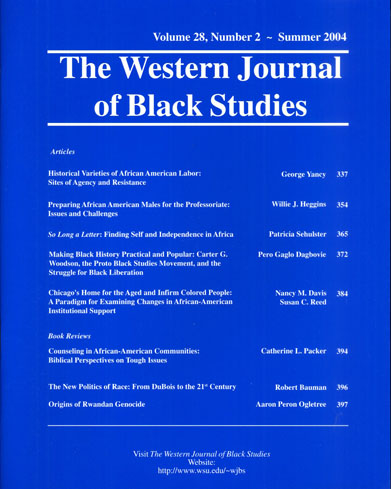Volume 28, Issue 2
Historical Varieties of African American Labor:
Sites of Agency and Resistance
George Yancy
This article explores a variety of African-American sites of labor activity. Labor historians and social historians have used such terms as “agency,” “resistance,” “self-activity,” “pro-activity,” and “opposition” to describe such sites of labor activity. In this article, it is maintained that there is a paucity of theoretical discussion around the concept of African-American agency vis-ˆ-vis various historical sites of labor activity. In short, the use of the term “agency” within these contexts has been under-theorized. Readers are often provided with ample historical descriptions of instances of agency with very little or no theoretical attention given to the nature of what constitutes agential behavior. To accomplish this theoretical effort, the author draws from the work of African-American psychologist Adelbert H. Jenkins, showing that African-Americans, given their historical oppression, have had to engage in acts of agency in ways that gave the outward appearance of accommodation. The author argues that beneath this “outward appearance of accommodation,” Black folk engaged in dynamic processes of dialectical thinking that enabled them to envision possibilities that were actionable (and thereby “freeing”) in the very midst of white hegemony and oppression.
pp. 337-353
Preparing African American Males for the Professoriate:
Issues and Challenges
Willie J. Heggins
The purpose of this study was to explore issues germane to the preparation of African American men involved in the ‘Preparing Future Faculty’ (PFF) program, with particular attention to contextual issues and challenges that serve as both support and barriers. Results indicate that networking, mentoring and research support were themes that emerged as strategies for addressing issues faced by prospective African American male faculty. Respondents in the study suggested the following important actions for African American men preparing to be faculty: 1) emphasizing in increased involvement in professional development, 2) establishing awareness of the professional culture, 3) understanding roles and responsibilities, and 4) defining a relationship with senior faculty. Those efforts were critical to recruitment, retention, and advancement as prospective faculty.
pp. 354-364
So Long a Letter:
Finding Self and Independence in Africa
Patricia Sehulster
“So Long A Letter: Finding Self and Independence in Africa” posits the premise that while Mariama Ba’s So Long A Letter does indeed present a feminist perception and the idea that women’s friendships serve as important to survival, it also stands as an allegory of Africa’s journey from colonization to independence by using the fictional predicament of women as parallel to that journey. In addition, the novel showcases the stages of a once-colonized writer coming into her own writing, as those stages are viewed by Franz Fanon. Using as its background the analysis of Frantz Fanon, Christopher Miller, Amilcar Cabral, Gaurav Desai, Steven Feierman, Kadiatu Kanneh, V. Y. Mudimbe, and Ngugi Thiong’o regarding the process of colonization to liberation, the essay marks the parallels between these steps and those taken by Ramatoulaye and Aissatou to overcome their “colonization” by Modou and Mawdo.
pp. 365-371
Making Black History Practical and Popular:
Carter G. Woodson, The Proto Black Studies Movement,
and the Struggle for Black Liberation
Pero Gaglo Dagbovie
Carter G. Woodson (1875-1950) wholeheartedly devoted himself to the early black history movement, an essential component of the proto (pre-Black Power era) Black Studies Movement. Woodson foreshadowed modern black studies scholars in stressing that the study of African descendants be scholarly sound, creative, restorative, and, most importantly, directly relevant to the black community. He popularized black history with a variety of innovative strategies and vehicles, including Association for the Study of Negro Life outreach activities, Negro History Week, and a popular black history magazine. This article explores how the multi-talented Woodson democratized, legitimized, and popularized black history. Special attention is paid to the nature of Woodson’s messages to various audiences and sectors within black communities. Dimensions of Woodson’s dynamic approach can be adapted to Black Studies paradigms and strategies of the twenty-first century.
pp. 372-383
Chicago's Home for the Aged and Inform Colored People:
A Paradigm
for Examining Changes in African-American Institutional Support
Nancy M. Davis, Susan C. Reed
For decades, African Americans, faced with enormous exclusion by the majority population, built hundreds of social institutions to provide basic services for their communities. The history of the Chicago’s Home for Aged and Infirm Colored People illustrates changes in African American leadership in community institutions that coincided with shifting demographic patterns and the rise of the Civil Rights movement. Middle class leaders remained committed to the home after migration accelerated and decreasing membership in women’s social clubs diminished available resources. Implications for the historical role of the Black middle-class in sustaining community institutions are discussed.
pp. 384-393
Book Reviews
Counseling in African-American Communities:
Biblical Perspectives on Tough Issues
Author: Lee N. June and Sabrina D. Black
Reviewed By: Catherine L. Packer
pp. 394-395
The New Politics of Race: From DuBois to the 21st Century
Editor: Marlese Durr
Reviewed By: Robert Bauman
pp. 396
Origins of Rwandan Genocide
Author: Josias Semujanga
Reviewed By: Aaron Peron Ogletree
pp. 397-398

| The WJBS site is normally maintained by Tanya Gonzales. Please feel free to e-mail comments, queries, and suggestions. |
Heading using the h3 tag
Lorem ipsum dolor sit amet, consectetur adipisicing elit, sed do eiusmod tempor incididunt ut labore et dolore magna aliqua. Ut enim ad minim veniam, quis nostrud exercitation ullamco laboris nisi ut aliquip ex ea commodo consequat. Duis aute irure dolor in reprehenderit in voluptate velit esse cillum dolore eu fugiat nulla pariatur. Excepteur sint occaecat cupidatat non proident, sunt in culpa qui officia deserunt mollit anim id est laborum.